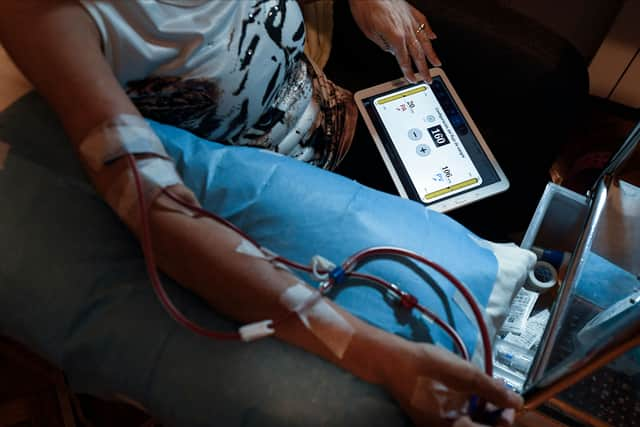A charity is warning that rising energy bills may force kidney patients to skip dialysis treatments at home
and live on Freeview channel 276
Thousands of patients with kidney failure rely on dialysis to keep their blood clean and prevent a toxic build- up of waste products and fluid. Many use home dialysis machines to avoid thrice-weekly trips to hospital and maintain a better quality of life.
The charity Kidney Research UK said it was “deeply concerned” that patients may skip sessions to save on energy bills. International research has shown patients who miss treatments have a 68 per cent higher mortality rate.


Advertisement
Hide AdAdvertisement
Hide AdPatients on dialysis can also become very cold because blood is circulated outside of the body and cooled and then returned.
Stephen Blom, who lives in Paisley, Renfrewshire, and is a former champion cyclist, has been told his kidney transplant is now failing after seven years and he is likely to require to start full-time dialysis by next month.
He said: “When you get to the dialysis stage, all your body heat goes away, you are constantly freezing.
“When I first went onto dialysis I never had the heating off. It could be a summer’s day and you will have several layers of clothing on.
Advertisement
Hide AdAdvertisement
Hide Ad“If you have got the machine at home, you are having to be on it for five hours, three times a week.
“Nobody is really stepping forward and saying to us ‘don’t worry, we’ve got you covered’.
“What the NHS does do is you are allowed to apply for partial rate, but it’s very minimum.
“For anyone going on treatment most people are on Universal Credit, because it’s very difficult to have a job at the same time.
Advertisement
Hide AdAdvertisement
Hide Ad“Some people do it but it’s very hard. The cost of peoples’ outgoing is already high. They actually do food banks in certain parts of the hospital to help patients out. It’s discreet because people don’t want to be seen.”
Mr Blom has IgA nephropathy, also known as Berger’s disease, a kidney disease that occurs when the antibody Immunoglobulin A builds up in the kidneys, causing inflammation that damages kidney tissues.
He said: “I was told when I got my kidney transplant that it would last 10 years, but unfortunately it’s now starting to fail. IgA rips your kidneys to pieces over time so I’m now down 10 per cent in function.
“They have said I’ll have to go on dialysis sooner rather than later. Initially, I’ll be doing regular bouts in the hospital but once I see the dialysis nurse I’ll request a machine at home.
Advertisement
Hide AdAdvertisement
Hide Ad“That way, I can dialyse without the pressures of having to travel to hospital from Paisley to Glasgow three times a week.”
Mr Blom, who set up a charity Return To Life to support patients, said he was fortunate that a friend has agreed to become a live donor, meaning he may not require to go on the transplant list again.
Sandra Currie, chief executive of Kidney Research UK, said: “Dialysis sessions must be kept at a regular schedule for the wellbeing of the patient and we are deeply concerned that individuals may skip at-home dialysis sessions to save on energy bills.
“Research on an international scale and in the UK has shown patients who miss dialysis sessions were not only more likely to be hospitalised but also saw a 68 per cent higher mortality rate than those who attended every session.
Advertisement
Hide AdAdvertisement
Hide Ad“No-one should have to choose between food, heat or their essential treatment and the current offering of additional financial support will only delay the impact of the crisis rather than fix a looming disaster.”
Comment Guidelines
National World encourages reader discussion on our stories. User feedback, insights and back-and-forth exchanges add a rich layer of context to reporting. Please review our Community Guidelines before commenting.